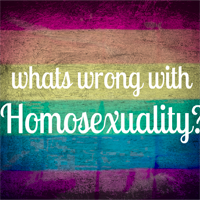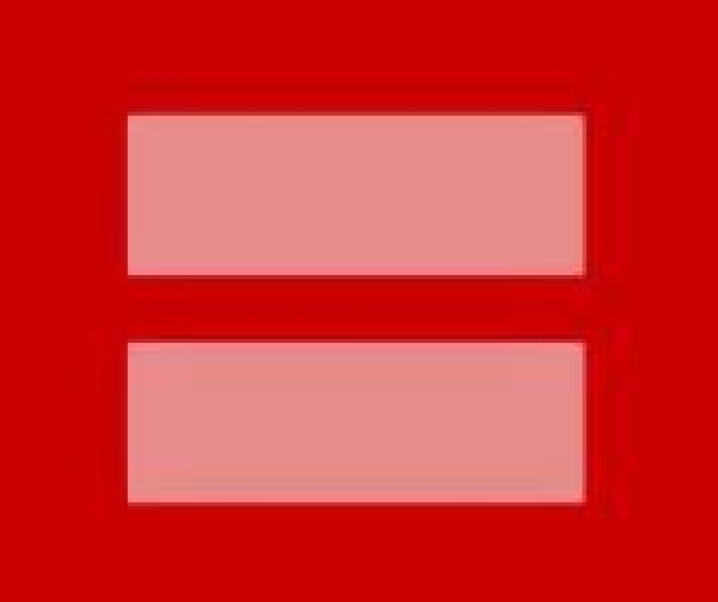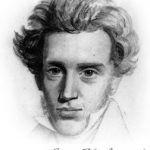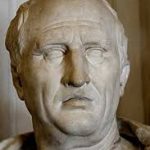PART ONE:
The Cultural Perspective
![]()
In general I try to keep my articles much shorter than this, however because this topic is so convoluted it required much more. In one sense this article is a result of a personal journey through my study of homosexuality within our culture. The article is divided as such:
Part One: The Cultural Perspective
This section aims at understanding homosexuality in Western culture from a historical perspective in light of the claim that this way of life is not a choice and is an aspect of human nature.
Part Two: The Theological Perspective
This section aims at considering the religious/theological objections to homosexuality and determining if the common understanding of these conclusions are accurate.
Therefore, it is my hope that understanding both parts together will provide one with a better understanding of the cultural situation while at the same time providing an appropriate religious attitude toward this subculture.
It is my goal to provide a fair evaluation of this topic in a way that is respectful and promotes dialogue between Christians and the LGBT community. I am not interested in simply regurgitating arguments from either side, but would like to consider the topic in a rational logical manner.
There is no issue in today’s culture which provokes more debate than homosexuality. There are several reasons for this, which we will discuss later, but suffice it to say it’s complicated. The topic becomes increasingly convoluted when you add emotion, personal anecdotes and misunderstanding.
When you have two extreme positions that dominate the various forms of media it can be difficult to have a robust dialogue regarding the topic. As is almost always the case both extreme positions are wrong. But extreme positions are not without utility. They can oftentimes serve as a foil in order to bring about a more moderate (and accurate) solution to a problem.
Understanding the historical situation.
There are many misconceptions regarding “homosexuality” within history. First, the term itself was coined by 19th century psychologist Karoly Maria Benkert and was meant to refer to “same sex attraction”. Even though the term is a part of modern history, the idea of same-sex attraction is one that dates back to Old Testament times.

However, the situation the west currently finds itself in, IS unique and is NOT a part of the historical conversation. For example, it is true that the “act” of homosexuality is historically rooted, but homosexuality as a particular “lifestyle” is a modern phenomenon.
Historical homosexuality is deeply rooted in the culture to which it belongs. In each of these societies the act of homosexuality commonly took place as an extramarital act and therefore was not associated with loving meaningful relationships, but as pleasure. It was also more common among those of upper-class status than those who were “pheasants”. (See Bruce Thornton’s research to learn more) In addition, it was not practice among women as it was men. It was a much rarer phenomenon among women as they were expected to exercise restraint and exude class as a representative of the family unit.
Ancient Roman and Greek documents confirm these facts as we see laws pertaining to aspects of this like “age of consent” (ex. if a man wanted to have sexual relations with a boy who was considered under age, then he would have to receive the parent’s permission). An example of one of these laws is referred to as Lex Scantinia.
The false perception of the biological sciences.
In today’s culture, it is largely assumed that homosexuality is the result of ones biology. That is, some people have a predisposition to homosexual behavior and are thus acting naturally. Therefore, because it is natural, the individual has no choice who they are attracted to. One reason for this claim is due to the historical nature of homosexuality (and thus the reason for the previous section).
This does present us with a puzzling question: is the homosexuality practiced historically a result of an individual’s nature or proclivity?
I’m not sure we can answer this question, but we can postulate a few things; first, technically, individuals in history were practicing bisexuality, not homosexuality. It’s certainly possible that these individuals were simply catering to the cultural axioms of their day by denying their homosexual urges. However, these societies were very liberal regarding morality. Moreover, it seems that if there were to be some sort of social norm created that those societies would be ideal (even more so than our own) to do so. So, it doesn’t seem that fear of castigation is a sound reason. Therefore, the positive evidence (evidence apart from inferences) suggests that the homosexual act was a result of one’s particular sexual proclivity (we might say fetish) rather than something natural.
Second, we have no evidence to suggest that “a loving commitment” was a part of the behavior; thus reinforcing the aforementioned conclusion. This is an important point that we will discuss in greater detail later.
However, greater than the historical assumption, is that homosexuality is biological. Operating partly off the thesis that the historical argument is sound, biologist have attempted to understand the genes that are associated with homosexual behavior. Although this research has turned up positive results (in the affirmative toward homosexuality as being natural); it is far from reaching anything definitive.
Even the American Psychological Association states:
Knowing this, I am puzzled as to why the majority within our culture assumes that science affirms homosexuality as natural thus denying the possibility of choice.
The evolutionary contradiction.
Some time back, I posited that, if we look strictly at the logical processes contained within evolutionary theory, in conjunction with the so called biological/historical evidence that is presented, then we have a significant contradiction. Whether it’s survival of the fittest (more broadly) or natural selection (more specifically), basic evolutionary theory should prohibit homosexuality as a natural occurrence within all male/female type species.
In general, if a species is unable to contribute to the overall success of that species propagation, then it would be eliminated as the weaker of the two types of species (ones who can create offspring as opposed to ones that cannot). More specifically, a species that cannot reproduce or adapt to its genetic change (or mutation) has no way of surviving as a species.
It seems almost obvious then (assuming evolutionary theory to be true), that if nature has made our species male/female; and only those two types can propagate a species together (with the exception of a few species that reproduce asexually, but even in these cases the entire species reproduces that way, so there is not competition among species), then heterosexuality is the only natural form of sexuality that exists.
Moreover, it’s not in any species best interests (especially the highest functioning ones such as humans) for nature to evolve that species sexually from heterosexuality to homosexuality without also either, changing the entire species, or evolving a new form of reproduction to accommodate the change.
Therefore, since we know in at least the case of the human species that we are only able to reproduce through heterosexuality, then it must be the case that either, evolutionary theory is untrue (or at least a significant part of it), or homosexuality is not “natural”.























Psych Prof
March 4, 2014I think you vastly misrepresent the professional mental health position on sexuality here. The consensus is that sexual preference is innate and immutable. No legitimate organization recognizes reparative therapy as a valid or ethical treatment for homosexuality. While we may not know exactly what genetic make-up leads to sexual preference, it is pretty clear that it’s not 100% a choice.
Second, the discussion here is filled with logical fallacies. The ‘both sides are too extreme’ argument is one example. The discussion of evolution as supporting being gay as abnormal is another. Natural selection does not necessarily imply an individual has to reproduce- there are a number of supporting theories for why homosexuality is compatible with evolution.
Finally, the argument that all biblical time (or maybe all past history? I’m not clear on exactly where your argument is anchored) same sex relationships were purely sexual ignores a great deal of history and evidence of loving and supportive same sex relationships.
Eric English
March 4, 2014Prof.,
Thank you for participating in the conversation. Interesting though that you think I misrepresent the mental health profession, when I simply make one statement, and that statement is a direct quote from the APA. I provide no commentary; I simply quote from the article that is cited. The quote seems pretty clear and unambiguous.
Furthermore, I never once mention or even imply anything about “reparative therapy”. In fact, I had to look it up because I wasn’t quite sure what it meant. After looking it up, I can assure you I would NEVER condone that type of pseudo-therapy. It’s hokum.
Regarding your note about logical fallacies: you are incorrect with your assertion that I committed a “logical fallacy” regarding positions of extremes. In fact, the statement “both sides are too extreme hence not true” is simply extracted from the logical fallacy of “an appeal to extremes”. Moreoever, I did not commit a logical fallacy I explained why I wasn’t going to fall into the trap of using that fallacious way of thinking.
Regarding your other concerns. I wish you would have provided some evidence supporting your statements about misrepresenting evolution, instead of simply stating your opinion as a fact – which ironically is committing a fallacy. I provided what I believe to be a logically sound argument for why homosexuality and evolution (I even qualified evolution in order to avoid extremes by saying most of evolution, but not all…) are incompatible with one another. The burden of proof is on you to show me the flaw in my thinking.
Regarding natural selection. This is the definition: The process by which forms of life having traits that better enable them to adapt to specific environmental pressures, as predators, changes in climate, or competition for food or mates, will tend to survive and reproduce in greater numbers than others of their kind, thus ensuring the perpetuation of those favorable traits in succeeding generations.
I don’t see how what I said contradicts or misrepresents this definition.
Your final statement is completely false. I not only cited a well known source, but you can also refer to the Stanford encyclopedia of philosophy to get that historical information. I admit the possibility that the history I have read is not accurate, but it is, at the very least debatable and yet your statement is said with such certainty.
Harold Kulungian
October 28, 2023The question “What is Wrong with Homosexuality?” was written with an astonishing ignorance of the obvious public health statistics behind sexual dysfunction, and also a total blindness about the present future health implications of unnatural sexual relations! Has the writer been living under a rock! Look at the Wikipedia pages listing just the names of New York Writers who have died of AIDS! Look how popular Gay Writers have become in the New Yorker, where one Gay man has published excerpts from his 1980s Journals telling of his visits to his Gay friends, and mentioning the death from AIDS of Hollywood celebrity Rock Hudson in 1925, and remarking tartly “Poor bastard.” It’s by reading the Gay writers that the true meaning of homophobia becomes apparent, as the fear of their friends dying regularly, and which of their Gay friends will perish next. Doesn’t this writer know the easily available Public Health Statistics, e.g., that over 40% of Americans are obese? Are obese people remarkable for their sexual vigor? That not 1 in 4 young American men is fit to be enlisted in Military Service? That 1 in 5 American newly-wed couples cannot conceive a child without hi-tech IN VITRO laboratory assistance? That even the mainstream medical establishment has designated our common degenerative diseases–cancer, heart disease, diabetes, arthritis, etc.–to be distinctly “Western Diseases”, and have published well-researched books on–let’s face it–the biological degeneration of Western Civilization? How can Joe English keep himself so blind to easily known facts? Historically, homosexuality arises in affluent societies in their postwar years: in Paris in the Belle Epoque, 1871-1914, (Proust, etc.) following the Franco-Prussian War. Then in London in the Bloomsbury Set, following WWI. And finally in USA in 1960s in “The Affluent Society” that John Kenneth Galbraith wrote about in 1952. -Harold Kulungian
Eric English
November 12, 2023Harold, sorry it took so long for me to respond. Thank you for your comments. I do not live under a rock, I live in a house. Additionally, Wikipedia is not a valid source, you learn that in elementary school. Homosexuality did not and does not cause aids. Heterosexuals can contract the virus as well. You are clearly homophobic and don’t really care about the topic. You simply care about spreading hate. Good day sir.